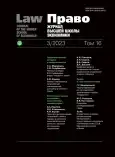Specifics of Regulatory and Legal Regulation of Generative Artificial Intelligence in the UK, USA, EU and China
- 作者: Li Y.1
-
隶属关系:
- Institute of Comparative Law, China University of Political Science and Law
- 期: 卷 16, 编号 3 (2023)
- 页面: 245-267
- 栏目: Law in the Modern World
- URL: https://journal-vniispk.ru/2072-8166/article/view/318263
- DOI: https://doi.org/10.17323/2072-8166.2023.3.245.267
- ID: 318263
如何引用文章
全文:
详细
作者简介
Yao Li
Institute of Comparative Law, China University of Political Science and Law
Email: noreply@hse.ru
ORCID iD: 0000-0002-9933-7513
Postgraduate Student
参考
- Cai S., Yang L. (2023) Study in the risk and collaborative governance of ChatGPT intelligent robot application. Qing bao li lun yu shi jian=Intelligence Theory and Practice, no 5, pp.14-22 (in Chinese)
- Cao J. (2023) Toward trustworthy AI: governance challenges and responses to ChatGPT-like generative artificial intelligence. Shang hai zheng fa xue yuan xue bao=Bulletin of Shanghai Institute of Politics and Law, no. 4, pp. 28-42 (in Chinese)
- Cao S., Cao R. (2023) Impact of generative AI on exploration science research and practice using ChatGPT as an example. Xian dai qing bao=Contemporary Exploration Science, no. 4, pp. 3-10 (in Chinese)
- Chen B. (2023) Rule of law basis for the credible development of generative artificial intelligence. Shang hai zheng fa xue yuan xue bao=Bulletin of Shanghai Institute of Politics and Law, no. 4, pp.13-27 (in Chinese)
- Deng J., Zhu Y. (2023) Legal risks of ChatGPT model and strategies to overcome them. Xin jiang shi fan da xue xue bao (zhe xue she ke ban)=Bulletin of Xinjiang Pedagogical University (Philosophy and Social Science Series), no. 5, pp. 91-101(in Chinese)
- Gu N. (2023)Emergent ability, risk regulation and industrial coordination of generative artificial intelligence. Jin chu fa xue=Jingchu Law Review, no. 3, pp. 7083 (in Chinese)
- Jin S. (2022) The DEPA path of global data governance and China's choice. Cai jing fa xue=Finance and Economics Law, no. 6, pp. 96-110 (in Chinese)
- Liu Y. (2023) The three major security risks of generative artificial intelligence and legal regulation — Taking ChatGPT as an Example. Dong fang fa xue=Eastern Law, no. 4, pp. 30-43 (in Chinese)
- Que T., Lu C. (2021) Technological innovation and the paradigm shift of public administration in the intelligence era. Zhong guo xing zheng guan li=Chinese Administrative Management, no. 2, pp. 21-30 (in Chinese)
- Shang J. (2023) Study in rules for generative AI risk governance. Dong fang fa xue=Eastern Law, no. 3, pp. 4-17 (in Chinese)
- Sun Y., Zhou X. (2011) Study in progress of content filtering technology. Xin xi an quan yu tong xin bao mi=Information Security and Communication Secrecy, no. 9, pp. 45-49 (in Chinese)
- Wang Y., Yan H. (2023) Risk iteration and regulatory innovation of generative artificial intelligence — a case study of ChatGPT. Li lun yue kan=Monthly Theoretical Journal, no. 6, pp.14-24 (in Chinese)
- Wei J., Tay Y. et al. (2022) Emergent abilities of large language models. Transactions on Machine Learning Research, no. 8, pp. 1-2.
- Yu X., Zheng G., Ding X. (2023) Generative Artificial Intelligence and the Law: Taking ChatGPT as an Example. Zhong guo fa lv ping lun=China Law Review, no. 2, pp.1-20 (in Chinese)
- Yuan Z. (2023) Study in the responsibility ability of generative artificial intelligence. Dong fang fa xue=Eastern Law, no. 3, pp.18-33 (in Chinese)
- Zhi Z. (2023) Generative artificial intelligence large models for information content governance. Zheng fa lun tan= Politics and Law Forum, no. 4, pp. 34-48 (in Chinese)
补充文件








